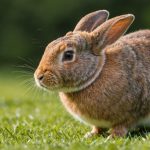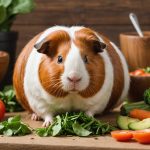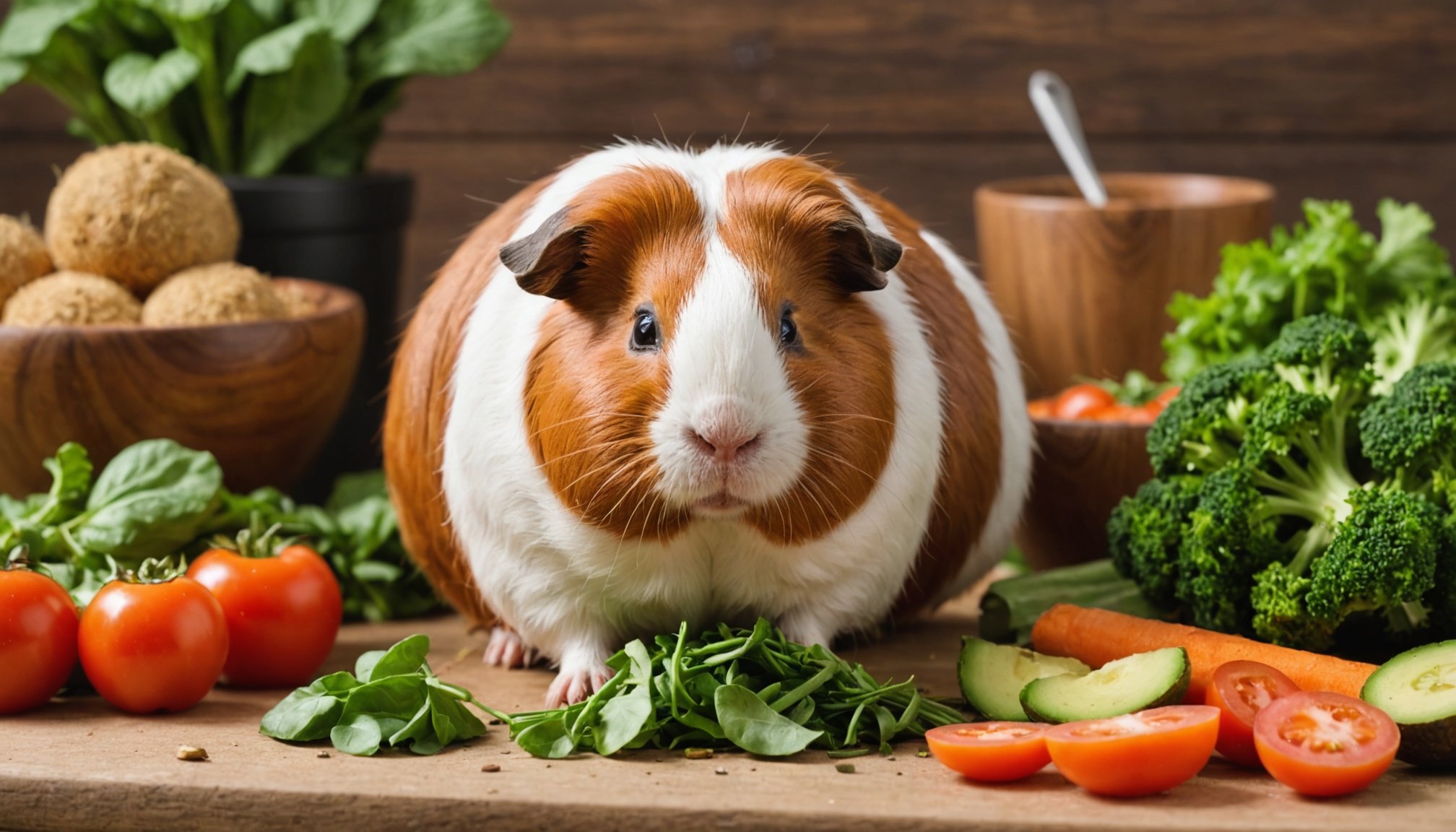Creating a balanced vegetarian diet for your guinea pig is essential for their health and happiness. These adorable creatures require specific nutrients to thrive, and understanding their needs can be overwhelming. By combining fresh vegetables, high-quality hay, and fortified pellets, you can craft a diet that meets their unique requirements. Uncover the best food options to keep your furry friend healthy and energetic, ensuring a long and joyful life together.
Understanding the Nutritional Needs of Guinea Pigs
Understanding the dietary requirements of guinea pigs is crucial for their health and well-being.
A lire en complément : Creating a Cozy Outdoor Haven: A Guide to Designing a Pet Duck Play Area in Your Small UK Backyard
Essential Nutrients
Guinea pigs require a diet rich in essential nutrients. These include proteins, carbohydrates, fats, vitamins, and minerals. A balance of these components ensures that guinea pigs maintain optimal health.
- Proteins: Necessary for growth and repair.
- Carbohydrates: Provide energy.
- Fats: Essential for energy and absorption of fat-soluble vitamins.
Importance of Vitamin C
Vitamin C is particularly critical for guinea pigs, as they cannot synthesize it on their own. A deficiency can lead to scurvy, a serious health issue. Ensuring a consistent supply of vitamin C through fresh fruits and vegetables or fortified pellets is vital.
Avez-vous vu cela : Essential Tips for Caring for an Elderly Rabbit with Arthritis in Your UK Home
Role of Fiber
Fiber plays a significant role in maintaining digestive health. It helps in the prevention of gastrointestinal issues. High-fiber foods, like hay, should be a staple in a guinea pig's diet.
Here's a concise list of essential nutrients:
- Vitamin C
- Fiber
- Proteins
By understanding and meeting these nutritional needs, guinea pig owners can ensure their pets lead a healthy and happy life. Prioritizing these dietary elements supports overall well-being and longevity.
Key Components of a Balanced Vegetarian Diet
Understanding the right balance of nutrients is essential for maintaining guinea pig health.
Types of Hay and Their Importance
Hay is a cornerstone of a balanced diet for guinea pigs, providing necessary fiber. Timothy hay is particularly recommended due to its high fiber content and low calcium levels, which help prevent urinary problems. Alfalfa hay, while nutritious, should be limited to young or pregnant guinea pigs due to its higher protein and calcium content.
Recommended Vegetables and Fruits
Incorporating a variety of vegetarian food like vegetables and fruits enriches a guinea pig's diet with vitamins and minerals. Leafy greens such as romaine lettuce, kale, and spinach are excellent choices. Fruits such as apples and strawberries can be given in moderation.
Proportions of Different Food Types
Maintaining correct proportions of food types is crucial for guinea pig nutrition. A typical daily meal should consist of:
- 75% Hay: Essential for digestion and dental health.
- 20% Fresh Vegetables: Provides vital nutrients.
- 5% Fruits and Pellets: Offers additional vitamins and variety.
By carefully selecting and balancing these components, guinea pig owners can ensure their pets receive the necessary nutrients for a healthy lifestyle. Encouraging a varied and balanced diet supports both the well-being and longevity of guinea pigs.
Portion Sizes and Feeding Frequency
Understanding the importance of portion control is crucial for maintaining your guinea pig's health. Proper feeding guidelines help ensure that your pet receives the right amount of nutrients without overfeeding.
Recommended Daily Portion Sizes
A well-balanced diet includes specific portion sizes for different food groups:
- Hay: Unlimited access, as it is essential for digestion.
- Fresh Vegetables: 1 cup per guinea pig per day.
- Fruits and Pellets: Limited to a small amount, about 1 tablespoon of pellets and a small slice of fruit.
Feeding Frequency and Its Impact
Regular feeding schedules are vital. Offering food twice daily helps maintain a stable metabolism and prevents obesity. Consistent feeding frequency ensures that your guinea pig receives nutrients throughout the day, supporting their overall health.
Importance of Fresh Water
Hydration is as important as food. Always provide fresh water, changing it daily to prevent bacteria buildup. Consider using a water bottle with a sipper tube to keep the water clean. Proper hydration supports digestion and prevents urinary problems.
By adhering to these feeding guidelines and ensuring adequate hydration, you can promote a healthy lifestyle for your guinea pig. Balancing portion control and feeding frequency helps in maintaining their well-being and longevity.
Common Dietary Mistakes to Avoid
Ensuring the health of your guinea pig requires vigilance in dietary choices.
Overfeeding vs. Underfeeding
Overfeeding and underfeeding are common dietary mistakes that can impact guinea pig health. Overfeeding can lead to obesity and related health issues, while underfeeding may result in nutritional deficiencies. It's essential to understand the proper portion sizes and feeding frequency to maintain balance.
Foods to Avoid
Certain foods pose toxicity or health risks and should be avoided. These include:
- Chocolate: Highly toxic to guinea pigs.
- Onions and Garlic: Can cause digestive issues.
- Dairy Products: Not suitable for guinea pigs' digestive systems.
Misconceptions About Dietary Needs
Misunderstandings about guinea pig dietary needs can lead to feeding errors. Some owners mistakenly believe that guinea pigs can eat the same foods as rabbits, which is not true. Guinea pigs have unique nutritional requirements, such as the need for Vitamin C, that differ significantly from other small animals.
| Common Mistakes | Consequences |
|---|---|
| Overfeeding | Obesity |
| Underfeeding | Deficiencies |
| Toxic Foods | Health Risks |
Avoiding these dietary mistakes ensures that guinea pigs receive the nutrition they need without the risk of health complications. By being aware of these common errors, owners can make informed decisions that support their pet's well-being.
Health Issues Related to Improper Feeding
Understanding dietary health issues in guinea pig care is crucial for preventing health risks.
Common Health Problems Caused by Poor Diet
Dietary health issues can significantly affect guinea pigs, leading to various health risks. A poor diet often results in obesity, dental problems, and gastrointestinal issues. These conditions stem from an imbalance in nutrients, such as excessive carbohydrates or insufficient fiber. Obesity increases the risk of heart disease, while dental problems can cause pain and difficulty eating.
Signs of Nutritional Deficiency to Watch For
Recognizing signs of nutritional deficiency is vital in guinea pig care. Symptoms include lethargy, weight loss, and a dull coat. Vitamin C deficiency, in particular, can lead to scurvy, characterized by swollen joints and bleeding gums. Monitoring these signs helps address dietary health issues before they escalate.
Importance of Regular Veterinary Check-Ups
Routine veterinary check-ups are essential to mitigate health risks associated with improper feeding. Vets can identify early signs of dietary health issues and recommend dietary adjustments. Regular check-ups ensure that guinea pigs maintain a balanced diet and receive necessary nutrients.
- Common Health Problems: Obesity, Dental Issues, Gastrointestinal Distress
- Signs to Watch For: Lethargy, Weight Loss, Dull Coat
- Veterinary Check-Ups: Early Detection, Dietary Adjustments
Addressing these aspects of guinea pig care promotes overall health and prevents serious dietary health issues.
Tips for Transitioning to a New Diet
Supporting your guinea pig through dietary changes requires careful planning and attention.
Introducing New Foods Gradually
Diet transition is a delicate process that should be handled with care. Start by mixing small amounts of the new food with the old diet to allow your guinea pig to adapt. Gradually increase the proportion of the new food over a week or two.
Monitoring Reactions to Dietary Changes
Observe your guinea pig's behavior and health closely during the diet transition. Look for signs such as changes in appetite, stool consistency, and energy levels. These indicators can help determine if the guinea pig is adjusting well or if further adjustments are needed.
Importance of Patience
Patience is key when introducing dietary changes. Guinea pigs may take time to accept new foods. Rushing the process can lead to stress and digestive issues. Allow your guinea pig to adapt at their own pace to ensure a smooth diet transition.
- Steps for Transition: Gradual Introduction, Observation, Adjustment
- Key Observations: Appetite, Stool, Energy Levels
- Patience Tips: Slow Introduction, Monitor Health, Avoid Stress
By following these steps, guinea pig owners can facilitate a successful diet transition and promote their pet's well-being.
Personal Experiences and Testimonials
Insights from guinea pig owners on successful feeding practices.
Stories from Guinea Pig Owners
Guinea pig owners often share their personal anecdotes about successful diets that have kept their pets healthy and happy. One owner, Sarah, mentioned how introducing a variety of fresh vegetables improved her guinea pig's coat and energy levels. She emphasized the importance of consistency in feeding schedules.
Tips and Tricks Shared by Experienced Owners
Experienced guinea pig owners offer valuable tips and tricks to newcomers. A popular suggestion is to always have Timothy hay available, as it helps with digestion and dental health. Another tip is to introduce new foods gradually to avoid upsetting the guinea pig's stomach.
Community Resources for Ongoing Dietary Support
The guinea pig owner community is a rich resource for ongoing dietary support. Many owners participate in online forums where they exchange advice and experiences. These platforms often feature discussions on portion sizes, feeding frequency, and the best types of hay and vegetables.
- Common Tips:
- Consistent Feeding Schedules
- Gradual Introduction of New Foods
- Unlimited Access to Timothy Hay
By leveraging these stories and resources, guinea pig owners can make informed decisions about their pets' diets, ensuring they receive the best care possible.










